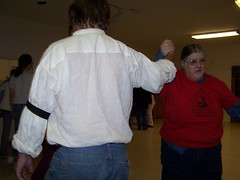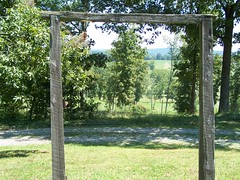 Crocus Bloom
Crocus Bloom
Originally uploaded by paynehollow.
In this season of get-togethers and parties, I’d like to share an excerpt of a sermon my pastor preached not long ago in a series on Hospitality. Hospitality as resistance! (There’s more of the series found here.) These comments are fitting with some of our recent conversations here.
…The Pharisees, as you may or may not remember, were one of the renewal movements of Jesus’ day. They were attempting, in a time of Roman occupation, to keep their identity as a people intact by being “holy, as God is holy,” to keep themselves separate from everyone else.
Do you remember what I said about how after the exile, some of the Jews were trying to become pure again, to regain their identity as God’s chosen people, by divorcing their foreign wives? Well, now hundreds of years later, the Pharisees are essentially doing the same thing. They are scared that they are going to be assimilated into the Roman culture, scared that they are going to disappear. How do you fight that? You stay separate from everybody else. Kind of like some of our fundamentalist Christian sisters and brothers today.
And so practically, what that meant for the Pharisees (and for some of our fundamentalist brothers and sisters) was that their major focus had to do with the laws regarding purity. The Pharisees didn’t have the police power to enforce these rules about purity, but what they did have was the power to ostracize. If you didn’t conform to the purity rules, then you would lose your civil and religious rights… You would lose your place as a child of Abraham in the life to come (once again, similar to Christian fundamentalists, who say that if you don’t follow a certain set of rules, you’ll go to hell).
And the major tool that the Pharisees used to ostracize people was to refuse table fellowship. To share a meal with a person was an expression of acceptance; to refuse to share a meal symbolized disapproval and rejection. And so, of course, the Pharisees would not share a meal with the non-observant, or the unclean. It was their way of keeping everybody and everything in its place, including the economic structures.
By the way, when the Pharisees here say that Jesus is eating with sinners, they’re referring, not to people who have individually sinned, which is how we often use the word, but to people, who because of their status in life, because of their occupation, or because of physical differences, or because of their poverty were deemed sinners.
And so after the Pharisees criticize Jesus, saying, Why is your Teacher eating with tax collectors and sinners? Jesus responds by saying, It is not those who are healthy who need a physician, but those who are sick. But go and learn what this means: “I desire compassion, and not sacrifice,” for I did not come to call the righteous, but sinners.
Jesus confronts the Pharisees with the fact that for all of the talk that they’re doing about making the people of Israel into a holy people, a kingdom of priests, the only ones they’re interested in are the ones who are already holy, already righteous, already paying their dues.
Jesus, on the other hand, is going after the riffraff, the sinners. Jesus is building a radical new society made up of all of God’s people, and he, of course, interprets who God’s people are in a totally different way. Jesus is painting a picture of what Israel was to be, an inclusive community reflecting God’s compassion, a table of hospitality, where everyone is welcome.









